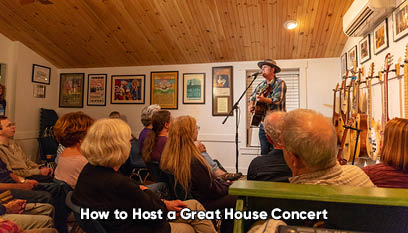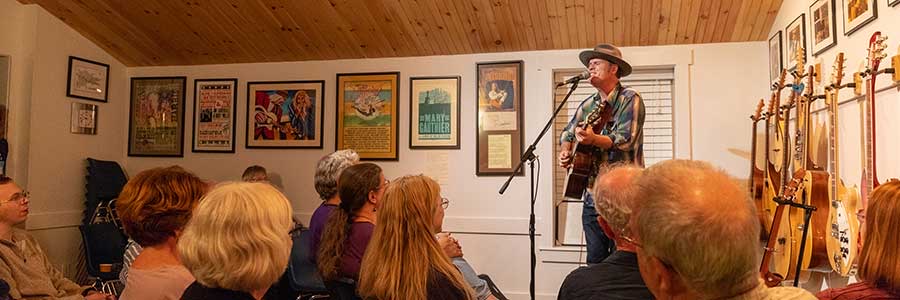
Red & Shorty’s
Small concerts at private homes have become a popular alternative to shows in regular venues like bars and clubs. At a house concert, the audience gets to mingle with the performers, and the whole experience is more cozy. These concerts are ideal for people who want to see live music, but want a break from the bar scene.
So how do you host a house concert and make sure it’s not an awkward disaster? I spoke to several people who have put on dozens of successful house concerts, as well as one house concert performer, to get some do’s and don’ts.
Thanks to Mike Morrison, Joe Simes, Ben Anderson, and Eric Ott for sharing their experiences and insight for this post.
Location
If you’re considering putting on a house concert, you may be worried about having enough space. You do NOT have to live in a mansion to do this, but it obviously doesn’t hurt if your living room (or whatever space you’re using) is fairly big.
Mike Morrison and his wife, Nani, hosted house concerts for 8 years in what they called The Big Room, which is 23′ x 23′. The typical attendance was 40-50 people. Joe Simes and his wife, Lorna, put on house concerts in a space that used to be a two-car garage. It’s called Red & Shorty’s. He says it’s probably about 350 square feet, and the capacity is around 40 people. Ben Anderson and his wife, Sarah, put on concerts in their barn, which has a capacity of 98.
House concerts tend to work well in rural areas for a few reasons. For one thing, there’s probably plenty of parking. Nobody wants to end a great night by discovering their car was towed! If you live in a country setting you’re also less likely to have neighbors close enough to complain about the noise.
Another benefit to hosting house concerts in the country is that there may not be a lot of places to see quality live music in the area. Hosting a house concert saves you the hassle of trekking to a club in the city.
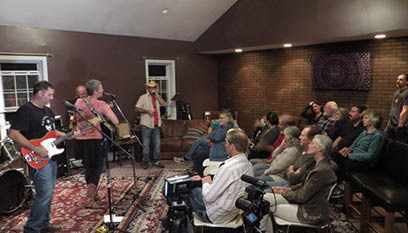
A house concert in the Big Room (courtesy photo)
Setting Up Your House Concert
Unless you have a huge space, it’s best to choose an acoustic act for your house concert and have the concert indoors. That way you won’t have to worry about amplification, and the concert won’t obliterate your audience’s eardrums or get you in trouble with the neighbors.
Outdoor house concerts can work, as long as you have some sort of Plan B for bad weather, and you don’t live in a densely populated area. Just keep in mind that you will probably need a small sound system for an outdoor concert to sound good.
So how do you find musicians to play at your house concert? Do your research about the artists you’re going to approach for this gig. They’re coming to your home (and possibly staying overnight!), so at minimum they need to be trustworthy.
You should also be really excited about introducing them to your friends. That means they should be great musicians and interesting, sociable people. Ideally, you would have already seen them live before, so you know what you’re getting.
The band doesn’t necessarily have to have a big following in your area. It’s really fun to expose your friends to wonderful music they may not have heard before! Just make sure you have enough friends who are interested in that type of music and would be likely to come. If you’re the only person you know who loves traditional Celtic folk ballads (or whatever the band plays), you will have a hard time filling the room.
For your first house concert, you may be more comfortable working with a musician you know in person. But if you’ve identified someone you don’t already know, contact them through their website. You may end up speaking with them directly or through a manager or an agent.
See if you can book your house concert for a day when they’re in your area anyway as part of a tour (but obviously not playing on the exact same night). Many performers now are doing entire tours on the house concert circuit, especially in the South.
After you agree on a date, you can hammer out details: the start time, end time, expected audience size, meal arrangements, lodging arrangements (if they’re not local), etc. It is pretty common for musicians from out-of-town to stay with their house-concert hosts, but this is certainly not mandatory.
Paying the Performer(s)
With a house concert, the host is responsible for paying the band. Assuming that you are not simply hosting a party at your own expense, there are a few ways to recoup that cost:
- Charge a cover at the door.
- Require people to buy tickets online in advance.
- Ask for donations to pay the band.
Of these options, #3 is by far the safest. Charging a cover or selling tickets to the show could suggest that you’re running an underground venue, and that can get you in trouble (as I’ll explain in a minute).
Keep in mind that the band will want a guaranteed minimum for the show, to make it worth their time. They won’t want to take the chance that only three people will show up and chip in $5 each. That means if your fundraising efforts come up short, you have to make up the difference. The more established the band is, the higher the guarantee is likely to be — but the easier it will be for you to fill the seats.
For his house concerts, Mike asks for a suggested donation of $15 per person, $10 for those in college, and $40 for a family, but he says people just contribute what they can — no one is turned away.
It might be tempting to just put out a donation jar, but personally asking the guests for a donation will bring in more money for the musicians. If the idea of asking your family and friends for money is making you cringe, try attending a house concert that someone else is hosting, and watch how they handle it. Hopefully you’ll see that it’s not as awkward as it sounds.
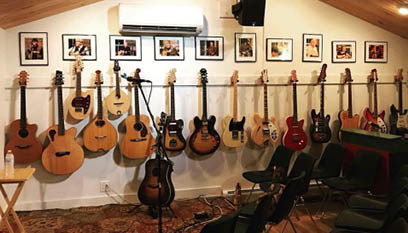
Red and Shorty’s (courtesy photo)
Making Your House Concert Successful
OK, so the musicians have committed to your event… Now what?
You need to get people to come to the show. Send invites via email or make a private Facebook event and ask for RSVPs. To protect your privacy and ensure that your cozy little event doesn’t get swamped with weirdos, only give out your address to people who are coming.
The musicians shouldn’t be giving out your address on their own websites or social media, either. They can post that they’re doing a house concert on that date, but people should contact you to reserve a seat.
Here are some planning tips to make sure your house concert is a great time for everybody:
- Have a clear start time, and plan on ending at a particular time (not too late). You don’t need to be militant about the schedule, but there should be more structure than a casual, open-ended party.Here’s how Mike says his house concerts typically go: “We start with a potluck around 6:30. Music starts around 7:45. The first set is short, around 35 minutes. We take a 15-minute break, which turns into a half hour. Everyone gets to meet the artist, buy some merch, get another beverage, get more food, use the bathroom, etc. Then we end with a 45-50 minute set. Music is usually done around 10 PM. I think people appreciate this. Older people can go home and younger people can still go out!”
- Figure out where the food and drinks will be so they’re not in the way of the actual concert. When you’re trying to listen to a delicate folk piece, the sound of crunching tortilla chips can really mess with the vibe.
- Set up rows of chairs facing the musician(s). This obviously gives your guests somewhere to sit, but it also helps to establish that this is fundamentally a concert rather than a party. If you don’t have enough chairs, see if you can borrow or rent some.You can also ask guests to bring their own chairs, especially if the concert is outside. People who go to outdoor music festivals are used to bringing a folding or camp chair with them.
- Be upfront with your guests about any pets you have, in case they’re allergic. Have a plan for managing the pets so they don’t run out of open doors, bark at strangers, etc.
- Don’t be afraid to make announcements during the event to help keep it on track, especially if you know some of your guests have never been to a house concert before. If you are really shy, recruit your spouse or a friend to MC for you. I talk to large groups all the time for my day job, so that doesn’t faze me at all.
Food and Booze
Any food and drink should either be provided for free or by donation. Don’t feel like you need to turn this into a full dinner party, though — you can just put out some basic snacks or desserts, or make it a potluck.
Some sort of alcohol is common at house concerts. If you’re providing it, you can put out a jar asking for contributions to offset the expense. Or you can make it clear that the event is BYOB, and you’ll provide water and coffee (or whatever).
Since this is a cozy acoustic show and you’ll know almost everyone there, you probably don’t have to worry about anyone getting wasted and belligerent. But you should still use some common sense where alcohol is concerned. For example, don’t let people stand on the sidewalk with alcoholic drinks, and don’t serve anyone under 21.
Selling Merchandise
The musician(s) may bring their own merchandise to sell, such as records, T-shirts, stickers, posters, etc. Don’t worry — as the host, you won’t be expected to hawk their stuff for them. Just let your guests know that the stuff is available for sale, and that’s it.
Zoning and Other Regulations
You should familiarize yourself with the potential legal ramifications of hosting house concerts, especially if you want them to become a regular thing.
Basically, you don’t want to give the impression that you’re running an underground venue.
If you’re just inviting 30 of your friends to your house to listen to a wonderful singer-songwriter, that’s one thing.
Mike says that approach has always worked for him. “We’ve never had any issues with local or state authorities, probably because we have always presented our house concerts as private events,” says Mike.
But if your event is totally open to the public and you’re putting up ads all over town, you start to look like a professional concert promoter.
Other signals that you’re treating this house-concert thing as a business include putting up a permanent sign in front of your house and charging money for tickets and drinks — especially if you are keeping some of the money for yourself. A true house concert is not a money-making scheme for the host.
I’m not going to attempt to cover all the various laws and ordinances that could come into play, but here are a few areas of potential concern once your house is deemed an illegal performance venue. Your house:
- isn’t licensed as a venue
- probably doesn’t meet every aspect of fire code
- probably doesn’t have accessible entrances and bathrooms
- might be located in an area that’s not zoned for commercial activity.
If you live in a condo, you may run into issues with the homeowners’ association. Your house concert arrangement may be in violation of some bylaw or another (and you can bet you have at least one neighbor who’s going to notice!). It’s a good idea to review the rules of your condo association before you consider hosting house concerts on a regular basis.
You may also get into trouble with a performing rights organization (PRO). These organizations make sure that artists get royalties when their songs are played “in public.” You can get around this by having your musician(s) play only their own original music, and by sticking to the invite-only rule.
Liability insurance coverage can be a concern, too. More people in and around your home means more opportunities for an insurance claim. For example, someone could slip on your icy driveway, or trip over an extension cord. It’s always smart to confirm the details of your insurance coverage before disaster strikes, and increase your coverage if necessary.
Disclaimer: I’m not a lawyer and this isn’t legal advice. I just want you to be aware that these legal issues exist, so you can get the appropriate professional advice for your situation.
When House Concerts Become More Serious
Sometimes these house concerts take on a life of their own. The owners of The Word Barn in Exeter, NH started hosting live music in their barn, and the whole thing took off — to the point that they got into some trouble and had to take steps to become more legit in the eyes of their town.
The Word Barn is owned by Ben and Sarah Anderson. Sarah teaches English at a prestigious prep school. The first events held at the Word Barn were actually poetry readings (hence the name).
Ben is the president of a local summer arts festival. He would get contacted by bands in the festival’s off-season. He wanted to book them, but had no place to put on the show.
So he and his friend Chris Hislop started a production company called Bright and Lyon. They started by putting on evening matinee shows before the regular acts at local clubs. Then, when a band they really wanted to bring (The Stray Birds) was coming through the area and the clubs they had relationships with were booked, Ben said, “Let’s do it in the barn!”
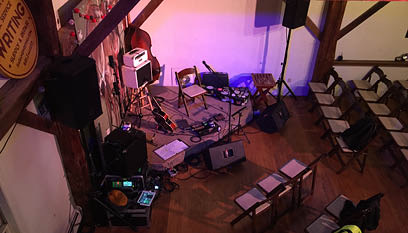
The Word Barn (courtesy photo)
The Word Barn’s capacity is 98, “making it just large enough to attract some exciting acts, but also small enough to preserve and offer a really great intimate vibe,” says Ben.
“I’d always known there were entire house concert circuits that performers often toured, but failed to realize the real power of them,” says Ben. “It’s a completely different experience than your average concert. There’s a stronger connection with the artist on stage, feeding off the audience and vice versa.”
So when did they know this was turning into a bigger thing? “I knew it was serious right from the get-go with The Stray Birds inaugural concert,” says Ben. “I was flying as high as everyone else after that experience and knew right away there was something special about this size room. It really hit home when The Stray Birds were returning to the area and passed on our offer to play a larger capacity venue, opting for The Word Barn experience again, despite the smaller capacity meaning less revenue for them.”
The Word Barn had been hosting successful concerts in the barn for about a year when someone turned them into the town for violating zoning ordinances.
“We ended up having to apply for a variance, which required legal support, but ultimately received approval,” says Ben. “It required doing work to make the space more accessible and upgrades to meet all fire codes. The legal and improvements came at a hefty cost, but knowing the space now holds permanency made it worth it in the end.”
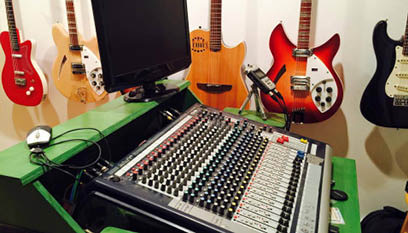
Red & Shorty’s (courtesy photo)
Ben says the hassle was totally worth it, and encourages anyone interested in hosting house concerts to give it a shot. “The only word of caution is to recognize the giant amount of work involved. I try not to think about how many glasses I’ve washed over the years,” says Ben.
Sound System
If you’re just hosting occasional acoustic acts in a small room, you don’t need a sound system. But if you are taking this house-concert thing pretty seriously, you may want to invest in some gear.
A sound system will allows you to expand beyond acoustic guitars and singer-songwriters.
Joe invested a considerable amount of money in his sound system, but he thinks it’s worth it. “My sound system cost more than my truck, but it is permanently installed and is very large,” says Joe, adding that he helped his friend buy a system for her house for under $500. “You never know what kind of crap gear musicians will show up with!”
The Word Barn doesn’t actually have a permanent sound system. The Andersons pay a sound engineer to bring some equipment and mix each show.
Playing House Concerts
So what’s the house concert experience like for the musicians? I spoke with Eric Ott, a singer/songwriter who has been there, done that.
Eric says the audience at a house concert is more interested in actually listening to the music than the average bar crowd is, which can be very rewarding for the performers. “They are a bit more vested in what you are doing than being in a bar and seeing you. It is a great way to sell yourself and your music.”
Remember that many of the people looking to host a house concert are newbies. You may have to explain how it all works. “Most of the downsides can be eliminated by great communication between the performer and the host,” Eric says. “Be pleasant, be early, be courteous!”
Final Thoughts
Hopefully you’re getting excited about hosting your first house concert! If you’re feeling uncertain about anything, focus on making the experience great for the musicians.
When Mike reflects on his 8 years of house concerts, he remembers some really great times. “I think our success has come from the fact we have always put the artist first. We let everyone know that we’re a listening room. When the songs get quiet, so are we. When the songs require some noise, we get noisy. We dance,” says Mike. “It’s all about supporting grassroots music, which is a spring that feeds all of music. Our reward is paid in world-class, mind-blowing music, played right in our home.”

